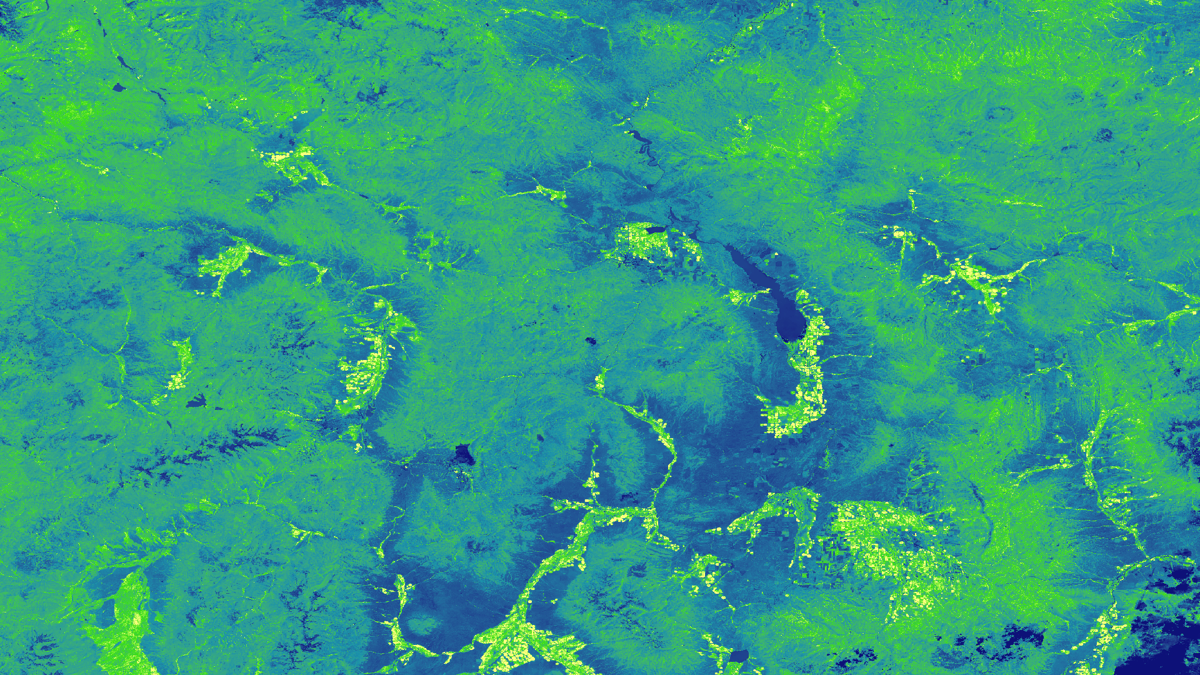
NASA

NASA
Tasseled cap greenness transformation derived from Landsat 8 imagery over lodgepole pine forest in the Intermountain West study area
Completed Projects
Julianne Liu
Team: Nash Keyes (Project Lead), caleigh McLaren, Nati Phan, Dalia Vazques
Summary: Milwaukee’s neighborhoods experience increased social, health, and ecological stress from the Urban Heat Island (UHI) effect due to changing land cover and climate. Extreme urban heat disproportionately...
Caroline Williams
Team: Heidi Rogers (Project Lead), Mistaya Smith, Maggie Mason, Anish Holla
Summary: Deforestation, a significant contributor to carbon emissions, is a major driver of climate change. To best inform climate mitigation, decision-makers must have accurate estimations of carbon emitted during...
Kathryn Caruso
Team: Kelli Roberts (Project Lead), William Hadley, Daniel Littleton
Summary: Wildfire potential monitoring, which is increasingly vital under climate change-induced droughts, could be improved by incorporating remotely-sensed soil moisture data. To better understand the connections between soil moisture and...
Brianne Kendall
Team: Jennifer Ruiz (Project Lead), Coral Del Mar Valle Rodríguez; Viviana Lademan; Aaron Whittemore
Summary: Central America is experiencing rapid and unregulated urban expansion, which is contributing to an increase in socioeconomic and environmental risks, including inequities in...
Brianne Kendall
Team: Hanna Jung (Deliverables Lead), Ross Kalter (Technical Lead), Ameilia Untiedt, Cristina Villalobos-Heredia
Summary: In 1992, Central America and Mexico drew up an agreement to establish the Mesoamerican Biological Corridor (MBC) which defines natural corridors to connect nearly 600 protected...
Tyler Pantle
Team: Nora Carmody (Project Lead), Dain Kim, Kameron Lloyd, Ruby Nagelberg
Summary: In pluvial flood events, stormwater runoff can pollute ground and surface water, posing a threat long after the rain has ceased. In Wyandotte County, Kansas, this contamination...
Tyler Pantle
Team: Suhani Dalal (Project Lead), Lily Gray, Yixuan Li, Jane Zugarek
Summary: The Gulf of Maine has a history of harmful algal blooms (HABs) that have increased in frequency and intensity in recent years, raising concerns in the...
Olivia Landry
Team: Lauren Mahoney (Project Lead), David Henriques, Nada Haddad, Thomas Ferrell
Summary: Both pluvial and fluvial flooding events pose direct challenges to urban infrastructure and communities across the United States. Heavy rainfall events oversaturate the ground, overflow waterbodies, and...
Olivia Landry
Team: Khaim Syed-Raza (Project Lead), Sofia Vahutinsky, Lisa Siewart, Nora Whitelaw-McDonald
Summary: The Keweenaw Bay Indian Community (KBIC) has a shoreline south of Lake Superior that is contaminated with copper stamp sands from legacy mining. The stamp sands have...
Kathleen Lange
Team: Ben Dahan (Project Lead), Melodi Hess, Rene Castillo, Vanessa Machuca
Summary: Offshore oil and gas production in the United States is a significant source of anthropogenic greenhouse gas emissions and accounts for nearly 30%...